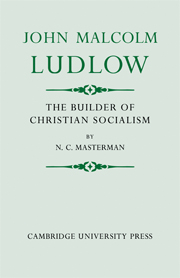Book contents
- Frontmatter
- Contents
- Acknowledgements
- INTRODUCTION
- I THE PARISIAN SCHOOLBOY
- II THE STRANGE YOUNG LAWYER
- III THE FRATERNAL CHRISTIAN
- IV FRENCH SOCIALISM FOR ENGLISH CHARTISTS
- V THE STATESMAN OF CO-OPERATION
- VI THE PRODUCER'S THEORETICIAN
- VII A PROPHET OUT-PROPHESIED?
- VIII REVIEWER AND EDUCATIONALIST
- IX THE DEMOCRATIC IMPERIALIST
- X THE MENTOR OF GERMANS
- XI LEGISLATOR AND CIVIL SERVANT
- XII THE CRITICAL UNIONIST
- Conclusion: LUDLOW'S ACHIEVEMENT
- Appendix: LUDLOW ON THE JUNTA
- Notes
- Bibliography
- Index
- Frontmatter
- Contents
- Acknowledgements
- INTRODUCTION
- I THE PARISIAN SCHOOLBOY
- II THE STRANGE YOUNG LAWYER
- III THE FRATERNAL CHRISTIAN
- IV FRENCH SOCIALISM FOR ENGLISH CHARTISTS
- V THE STATESMAN OF CO-OPERATION
- VI THE PRODUCER'S THEORETICIAN
- VII A PROPHET OUT-PROPHESIED?
- VIII REVIEWER AND EDUCATIONALIST
- IX THE DEMOCRATIC IMPERIALIST
- X THE MENTOR OF GERMANS
- XI LEGISLATOR AND CIVIL SERVANT
- XII THE CRITICAL UNIONIST
- Conclusion: LUDLOW'S ACHIEVEMENT
- Appendix: LUDLOW ON THE JUNTA
- Notes
- Bibliography
- Index
Summary
The Christian Socialist movement of 1848–54 has always baffled the historian. Most people agree as to what the Oxford Tractarians, the leaders of the previous religious revival stood for. But F. D. Maurice, the Prophet of Christian Socialism, is a peculiarly difficult theologian. Charles Kingsley, according to one of his biographers, ‘was unpredictable for his star traced no recognised orbit’. His friend, Tom Hughes, liked to use his fists, but it was not always clear with whom he was fighting.
Yet their activities were of some importance. The Christian Socialists were pioneer sanitary reformers; they played an important part in the history of co-operation and trade unions; they were—through the Working Men's College—influential in modern adult education. Their novels, theological treatises, pamphlets, articles and tracts were widely read.
This biography shows that there was in their midst someone of great political and administrative ability who knew much more clearly than any of the others what he wanted to do and was smitten with a strong determination to do it. This little-known figure was John Malcolm Ludlow.
It was he, the founder of the movement, who more than anyone else gave it a concreteness and definition which it would otherwise have lacked. His lucidity and powers of concentration compelled his colleagues to act for or against him, and alone make some of their actions and statements intelligible. His challenging behaviour produced a drama at the centre of the group which makes it apparent that, however much they may have supplemented his deficiencies, he also supplemented some of theirs.
- Type
- Chapter
- Information
- John Malcolm LudlowThe Builder of Christian Socialism, pp. 1 - 7Publisher: Cambridge University PressPrint publication year: 1963



